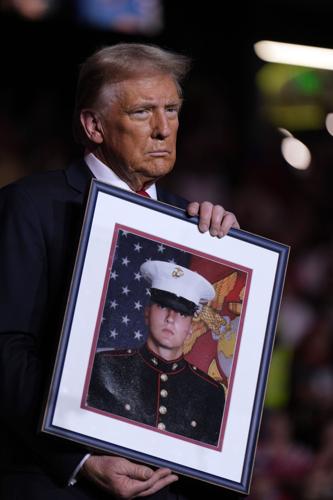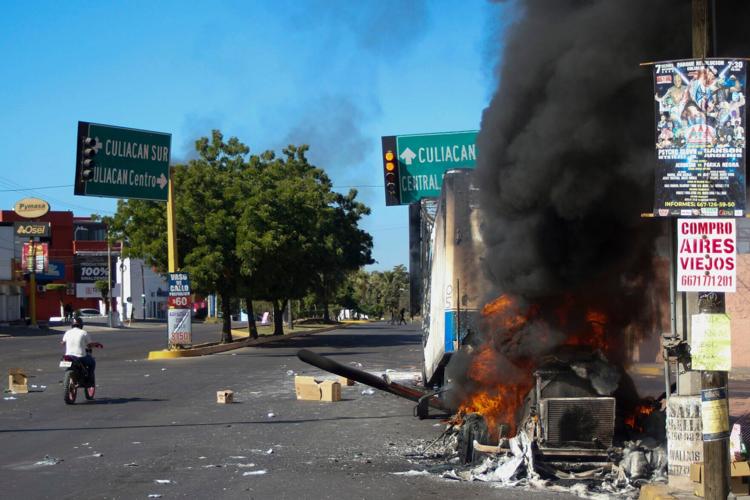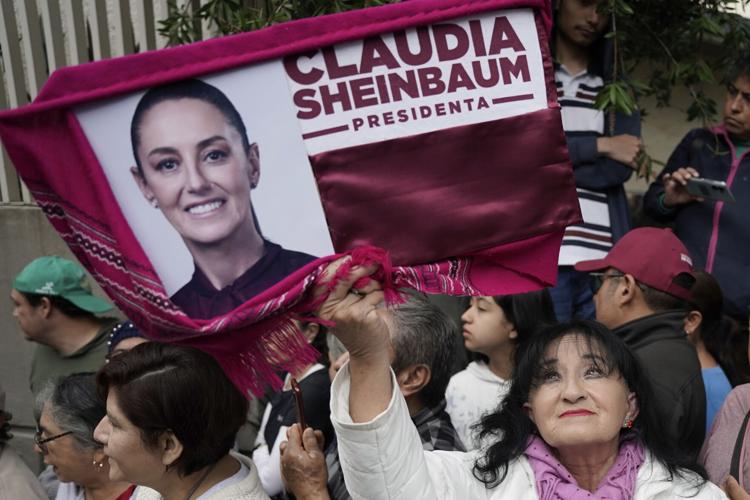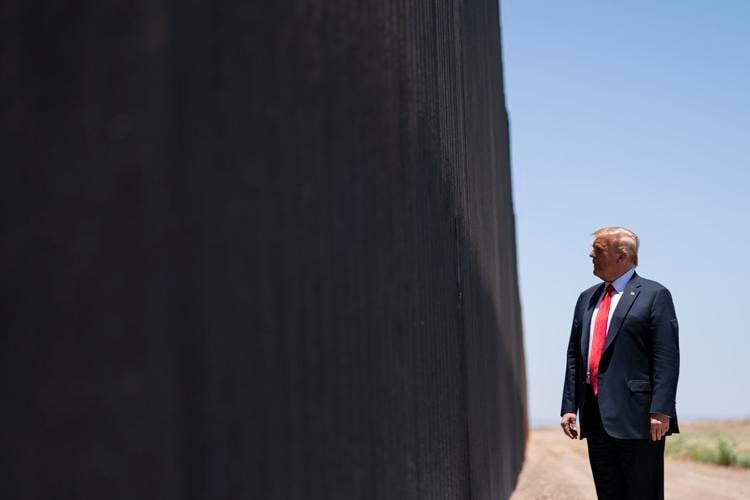Throughout his campaign, former president and now President-elect Donald Trump reiterated threats to send troops into Mexico and carry out U.S. military strikes on organized crime groups, which he’s said should be designated “foreign terrorist organizations.”
Border analysts told the Arizona Daily Star that as president, Trump’s hawkish rhetoric could end up alienating an important U.S. ally and diminishing chances for real collaboration with Mexico on security issues. But some say it could pressure Mexico’s leaders to take a more aggressive approach to organized crime.
At the least, Trump’s threats shouldn’t be dismissed as bluster, said Tony Payan, executive director of the Center for the U.S. and Mexico at Rice University’s Baker Institute for Public Policy.
“Knowing Trump, having observed both his rhetorical style, and his style of governing between 2017 and 2021, I can tell you that he must be taken seriously,” he said. “He said that clearly in his acceptance speech: ‘Promises made, promises kept.’”
Last month, Trump and running mate JD Vance seized on the Oct. 18 shooting death of a Tucson veteran in Sonora during their campaign rallies, promising again to eliminate organized crime in Mexico. Nick Quets, 31, was fatally shot after failing to stop at an unauthorized checkpoint, manned by armed men, while driving through a volatile part of northwest Sonora.

At a campaign rally Oct. 31, Republican former President Donald Trump held a photo of Marine veteran Nicholas Douglas Quets of Tucson, who was shot and killed on a Sonora, Mexico highway, allegedly by cartel members.
“Under the Trump administration we will achieve compete and total victory over these sadistic monsters,” Trump said at an Oct. 24 rally in Tempe, after addressing Quets’ family in the audience. “We will reclaim our territory, we will restore the sovereign borders of the United States of America, and we will put the cartels quickly out of business. They’re gonna be gone.”
Experts say the tough talk indicates Trump is ignoring the complexities of tackling organized crime in Mexico, and the implications of invading the U.S.’s top trading partner.
Any ground incursion into Mexico would deeply damage relations with a country Trump needs to fulfill his campaign promises on immigration, said Mexico City-based Elisabeth Malkin, deputy program director for Latin America and the Caribbean for the International Crisis Group. The nonprofit provides security analysis and policy advice aimed at conflict prevention.
Classifying cartels as terrorists “would not allow the president to send the Navy SEALs into Mexico without Mexico’s permission,” she said. If something like that happened, not only would it be illegal, but “Mexico would react very strongly, and the U.S. needs Mexico’s help in everything that matters to Trump: drugs, and migrants.”
Payan said other aggressive tactics — even covert drone strikes, as some Republicans have suggested — could be in play if the U.S. designated cartels as terrorists. Payan’s areas of research include cross-border flows, border governance issues and the U.S.-Mexico relationship.
Mexico’s previous president Andrés Manuel López Obrador usually avoided direct engagement with cartels under his “hugs not bullets” strategy, saying investing in fighting poverty and improving quality of life would end up disempowering organized crime groups. He argued that confronting heavily armed groups would lead to widespread destruction and civilian casualties.
But violence in Mexico surged under López Obrador’s administration, with more homicides than in any six-year presidential term, Mexican security data shows.

U.S. President-elect Donald Trump has pledged to eliminate Mexico’s cartels, and quickly, despite the complexities of the issue. Here, a truck burns after being set on fire Jan. 5, 2023, in Culiacan, Sinaloa state, Mexico. That was the day the government detained Ovidio Guzman, the son of imprisoned drug lord Joaquin “El Chapo” Guzman, which unleashed deadly firefights between the military and suspected members of the Sinaloa drug cartel.
It remains to be seen whether Mexico’s new president Claudia Sheinbaum, who took office Oct. 1, will continue the strategy, Payan said.
Trump’s threats aim “to make sure Mexico engages the U.S. and steps up pressure on the cartels,” he said. “Either way, the status quo is not sustainable any longer under a Trump administration.”
Sheinbaum may already be breaking with Lopez Obrador’s approach, to the concern of human-rights watchers. In her first month in office, the military and National Guard have already engaged in multiple bloody confrontations, with bystanders and migrants killed in the process, the Associated Press reported.

Supporters gather outside the house of Claudia Sheinbaum before she is sworn in as president in Mexico City on Oct. 1.
The impact of a U.S. tactical operation in Mexico could end up worsening violence on the ground in places like Sonora, depending on how those operations are carried out, Payan said.
“If it’s done carelessly, if it’s not done with thoughtful operations that are well-executed, it’s quite possible” more violence would result, he said.
Malkin says if Trump overplays his hand, it could diminish a real chance for binational collaboration on security with Sheinbaum.
In her previous role as Mexico City’s mayor, Sheinbaum was more open than López Obrador to collaborating with U.S. intelligence agencies, resulting in some major busts at the city’s airport, Malkin said.
“This sort of saber-rattling and bullying maybe isn’t the best way to try to improve collaboration,” she said.
Over-simplification
Trump is oversimplifying what it would take to tackle organized crime in a country where criminal links are embedded in government institutions, the economy and everyday life, said Adam Isacson, director of defense oversight for the Washington Office on Latin America, a D.C.-based research group that promotes human rights.
“It’s a common mistake to think that organized crime is like an anti-government insurgency, that they live separate from the population and all you have to do is bomb the hell out of them, arrest their leaders and they’re going to disappear,” he said.
The strategy doesn’t hold up when the targets are “deeply embedded in security forces, the judiciary, the governor’s office, the legal economy,” Isacson said. “They’re not living under triple-canopy jungle; they’re walking down Main Street.”
Mexico hasn’t been eager to collaborate with the U.S. on security issues, especially as tensions have risen over recent U.S. actions seen as violations of Mexico’s sovereignty.
A July operation to capture Sinaloa Cartel co-founder Ismael “El Mayo” Zambada and fly him to the U.S. for prosecution — without Mexico’s involvement, and with the apparent knowledge of U.S. agencies — has led to a surge in violence in Sinaloa, and heightened tensions with Mexico’s government, Isacson said.
With the Zambada operation, the U.S. may have been “sending a message to the Mexicans about what they think about their lack of cooperation,” Isacson said. “But by doing it that way, they upended the equilibrium of organized crime so that (the state of) Sinaloa is on fire, and hundreds of people have died.”
Some analysts say Trump is ignoring key factors closer to home that fuel violence in Mexico and drug trafficking, including Americans’ demand for fentanyl, the U.S.’s inability to scan most vehicles coming through its ports of entry — where the vast majority of fentanyl enters the country, smuggled by U.S. citizens — and the heavy flow of high-powered U.S. weapons and ammunition smuggled into Mexico.
Between 70% and 90% of firearms in Mexico came from the U.S., according to Mexico’s Secretariat of Foreign Relations.
Migrant advocates say restrictions on pathways to legally immigrate further enrich organized crime groups: When safe, legitimate means of migrating shut down, the only options left for people fleeing violence or poverty are the smuggling routes that are now under near-total control of organized crime.
Last year hundreds of Mexican residents fled the border town of Sásabe, Sonora amid an explosion in violence between factions of the Sinaloa Cartel, fighting for control of smuggling routes south of Arizona.
That’s an example of how profitable human smuggling has become for cartels, said Jeremy Slack, border researcher and associate professor in the Department of Sociology and Anthropology at the University of Texas El Paso.
“You didn’t used to see drug-war level violence around human smuggling routes, but now we do,” Slack said. “Immigration is big business to them, and it will be even bigger business the harder it gets to come to the U.S.”
Trump cares more about the issue of immigration than about violence in Mexico, Slack said. His threats to impose tariffs on Mexican imports are likely more realistic — and more worrisome to Mexico’s leaders — than his threats to engage with cartels directly, he said.
“I feel like he often just uses the violence issue as a reason that immigration is a bad thing,” he said. “He doesn’t talk about cartel violence without mentioning the problem of the border and immigrants.”
Impacts of ‘terrorist’ designation
Sending troops into Mexico, without a declaration of war by the U.S. Congress, would be an illegal act of aggression, Payan said. But Trump’s and Republicans’ previous calls to designate cartels as “foreign terrorist organizations” could pave the way for other tactics, he said.
A terrorist designation could allow the U.S. to engage in intelligence gathering in Mexico without the government’s permission, he said. U.S. actors could then use drones — as they did in Afghanistan and Iraq — to remotely take out specific targets, like fentanyl labs, he said.
While that would be legitimate under U.S. law, “Mexico would consider it a violation of its sovereignty and therefore illegal under international law,” Payan said. “It would be a major irritant” on U.S.-Mexico relations, but the U.S. could have “plausible deniability,” as criminal groups are increasingly using drones to attack one another, he said.
Such actions wouldn’t actually achieve much, some say.
Fentanyl labs are relatively cheap to set up and easily relocated, and taking out individual players in organized crime rings doesn’t achieve much more than generating headlines, said Malkin of the International Crisis Group.
“Fentanyl labs are in people’s kitchen. They’re very small and they’re very mobile,” Malkin said. “By the time they know where a fentanyl lab is, it will have moved and (the attack) could end up killing the family next door.”
U.S. agencies’ historical efforts to take out cartel leaders haven’t succeeded in slowing the drug trade, and usually generate more violence as others scramble to fill the power vacuum, experts said.
“We’ve never seen any evidence that does anything,” Malkin said. “When one group is weakened, another one quickly steps up.”
Existing laws on transnational criminal organizations already achieve much of what designating cartels as terrorist groups would do, Isacson said.
“Their assets are all but frozen. You can’t do business with them, you can’t do anything that would be supportive of them. They certainly can’t get visas to come to the United States,” he said.
But the terrorist designation would make penalties for U.S. banks that aid cartels in money laundering much more severe, Isacson said.
It would also give Mexican asylum seekers fleeing to the U.S. an even stronger case for their asylum pleas, he said.
Mexico’s leverage underestimated
Trump may be underestimating the leverage Mexico has over the U.S., border researchers said.
It’s largely thanks to Mexico’s aggressive immigration enforcement south of the border, plus the Biden administration’s June restrictions on asylum, that migrant arrivals at the U.S. have dramatically slowed since December 2023, when record numbers of migrants were surrendering to U.S. border agents to request asylum.
Trump also has Mexico to thank for heightened immigration enforcement during his first term, as well as the so-called “Remain in Mexico” policy his administration implemented in 2019, before it faced a court challenge. The policy depended on Mexico allowing the U.S. to return asylum seekers across the border to wait there — often in dangerous conditions — until their asylum cases processed.
If Trump follows through on his threats, “I think the consequences would be that Mexico would no longer cooperate with the anti-immigrant agenda,” Slack said.
On the day after the U.S. election Mexico’s new president, Claudia Sheinbaum, initially said it would be “prudent” to wait until all votes had been tallied before congratulating the winner. She also offered reassurances to Mexicans at home and abroad.
“To all Mexicans, there is no reason to worry,” Sheinbaum said in Wednesday’s daily press conference. “To our brothers and sisters living in the U.S., to their family members living here, to the business people, there is no reason to worry. Mexico will always prevail. We are a free, independent, sovereign nation and there will be a good relationship with the United States. I am convinced of that.”
Sheinbaum ended up congratulating Trump later in the day on Wednesday.
“I would like to express my most sincere congratulations to Donald Trump, who won the presidential election of the United States of America,” Sheinbaum wrote in a post on X, formerly Twitter. “I am certain that we will continue to work together in a coordinated manner, with dialogue and respect for our sovereignties, to advance the broad bilateral agenda that links us.”
Neither Sheinbaum’s office, nor that of Sonora Gov. Alfonso Durazo, responded to the Star’s request for comment late last week on Trump’s rhetoric about organized crime.
Organized crime evolving in Mexico
The structure of organized crime in Mexico has changed over the past 20 years, evolving from an era when six regional cartels operated relatively discretely, according to Mexico-based security analyst Eduardo Guerrero, director of Lantia Consultores and former director of Mexico’s National Electoral Institute.

Donald Trump touring a section of the border wall in San Luis, Arizona, in 2020.
Today two major groups — the Sinaloa Cartel and Jalisco Cartel — dominate, along with dozens of regional mafias and hundreds of local criminal cells that act as “subcontractors,” said Guerrero, during a virtual discussion hosted in April by the Georgetown Americas Institute.
Since Mexico’s war on drugs began in 2006, criminal groups have diversified their income streams from drug trafficking to include extortion of avocado farmers, fuel theft, kidnapping, human trafficking and human smuggling, according to a May assessment from the U.S. Drug Enforcement Agency.
The growing power of organized crime, and their long-time collusion with government authorities, has left some areas of Mexico largely under the criminal groups’ control, notably in southern state of Guerrero, where civilians are at the mercy of local mafias, InSight Crime has reported.
The violence, and widespread impunity for homicides and disappearances, are also driving forced migration to the United States.
Some of the cartels’ tactics now amount to psychological terrorism, in an effort to intimidate entire populations, including gruesome displays of dismembered or burned bodies, Payan said.
“A lot of the operations of these cartels have taken on a psychological component, an intimidatory component that I think must be taken seriously,” he said.
Many Mexicans want their government to more aggressively take on organized crime, Payan said.
“I think the Mexican government has neglected its No. 1 duty under the social contract, which is to provide citizen security,” Payan said.
The prospect of decisive action by Trump might force Sheinbaum to work more closely with the U.S. than her predecessor, he said.
“I think Sheinbaum would have no choice but to coordinate operations with the United States, or the U.S. will do it on its own,” he said.
Solutions
Building safe and regular avenues to immigrate — such as the Biden Administration’s CBP One application — disempowers criminal groups who profit off migrants’ desperation and lack of options, Slack said.
“The big issue for (criminal groups) over the past year is, ‘How do you continue to make money off immigrants when they can sign into an app and make an appointment and go to the border like anyone else?’” Slack said.
With Trump’s election, organized crime groups are celebrating, he said.
“Under a more restrictionist regime, having the Mexican government do this much more thoroughly in southern or central Mexico, is just going to make it so people have to pay more money and organized crime gets more benefit out of it,” Slack said. “It’s a bonanza for corruption.”
The most fruitful strategy for the U.S. would be to target corrupt government officials for colluding with organized crime groups in Mexico, Isacson said.
“If they want to confront Mexico, confront those people with proof,” he said, pointing to the U.S. prosecution of Mexico’s former secretary of public security, Genaro García Luna.
Last month in a U.S. district court, García Luna was sentenced to 38 years in prison and a $2 million fine for decades of assisting the Sinaloa Cartel, in exchange for millions of dollars in bribes, according to U.S. Homeland Security Investigations.
A focus on government corruption also requires “assiduously assisting and protecting” anyone in Mexico willing to investigate and denounce collusion with organized crime, Isacson said.
For Mexico’s mafias, those relationships with government actors are “the oxygen they breathe,” Isacson said. “Anyone actually going after breaking the links between the state and organized crime needs all the support from the United States they can get.”







